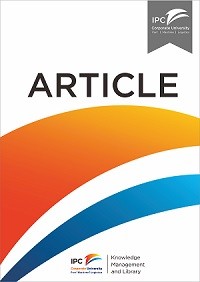Article
Human resource management impact on knowledge management - evidence from the Portuguese banking sector
This article focuses on questions of organizational knowledge, human resources and the dynamics of relations developed between them, within the dominant perspectives and assumptions in people management. The literature suggests that knowledge management (KM) is not alien to the orientations adopted in the management and application of processes related to people. A strong body of literature and various scientific studies give a foundation to the subject analyzed here, suggesting an analysis and comprehension based on a viewpoint of complementarity and interdependence of the 2 constructs (HRM and KM), considering the contribution they should make in terms of innovation, competitive advantage and organizational performance (Gloet and Berrel, 2003; Mansour and Gaha, 2004; Terriou and Chatzoglou, 2008; Majeed, 2009; Minbaeva, Foss and Snell, 2009, Lopez-Cabrales, Pérez-Luno and Cabrera, 2009; Simonin and Özsomer, 2009; Cheng and Huang, 2009; Brewer and Brewer, 2010). Specifically, concerning HRM processes, training, career development and retention are analyzed here, seeking to understand the relational dynamics developed between these 3 people-management processes and 4 knowledge-management processes: i) knowledge-centered culture; ii) competitive orientation; iii) formal knowledge management practices and; iiii) informal knowledge management practices, in organizations in the banking sub-sector of the service sector
Ketersediaan
Informasi Detail
- Judul Seri
-
-
- No. Panggil
-
ATC MG MEN h
- Penerbit
- USA : Emerald., 2016
- Deskripsi Fisik
-
36. p
- Bahasa
-
English
- ISBN/ISSN
-
-
- Klasifikasi
-
MG
- Tipe Isi
-
-
- Tipe Media
-
-
- Tipe Pembawa
-
online resource
- Edisi
-
-
- Subjek
- Info Detail Spesifik
-
-
- Pernyataan Tanggungjawab
-
Samuel Monteiro Lisete Mónico
Versi lain/terkait
Lampiran Berkas
Komentar
Anda harus masuk sebelum memberikan komentar

 Karya Umum
Karya Umum  Filsafat
Filsafat  Agama
Agama  Ilmu-ilmu Sosial
Ilmu-ilmu Sosial  Bahasa
Bahasa  Ilmu-ilmu Murni
Ilmu-ilmu Murni  Ilmu-ilmu Terapan
Ilmu-ilmu Terapan  Kesenian, Hiburan, dan Olahraga
Kesenian, Hiburan, dan Olahraga  Kesusastraan
Kesusastraan  Geografi dan Sejarah
Geografi dan Sejarah